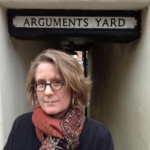
Norms of Public Argument: A Speech Act Perspective
Workshop at the NOVA University Lisbon, Portugal
In person
June 27-29, 2022
&
Special issue of TOPOI: An International Review of Philosophy
Summer school (June 23-25, 2022)
Confirmed invited speakers:
Rae Langton, University of Cambridge, UK

Rae Helen Langton is currently the Knightbridge Professor of Philosophy at the University of Cambridge. She has published widely on Immanuel Kant’s philosophy, moral philosophy, political philosophy, metaphysics, and feminist philosophy. She is also well known for her work on pornography and objectification. She has a long-standing interest in speech acts and social justice. Her research focuses on how certain forms of speech (including hate speech and pornography) can subordinate people, altering social norms and authority patterns and legitimating inequality. Moreover, she argues that some speech can also silence by making certain speech acts difficult or impossible.
Mary Kate McGowan, Wellesley College, USA
 Mary Kate McGowan is the Luella LaMer Professor of Women’s Studies and Professor of Philosophy at Wellesley College. McGowan specializes in studying the subtle ways that speech can be used to alter normative facts and how this technique may be involved in the perpetuation of unjust social systems. She argues that conversational contributions enact normative fact in a way that is not, at the surface, visible.Her more recent work has generalized this phenomenon to settings that are not entirely conversational, arguing that sexist speech, some pornography, and some types of hate speech are much more harmful than are currently recognized.
Mary Kate McGowan is the Luella LaMer Professor of Women’s Studies and Professor of Philosophy at Wellesley College. McGowan specializes in studying the subtle ways that speech can be used to alter normative facts and how this technique may be involved in the perpetuation of unjust social systems. She argues that conversational contributions enact normative fact in a way that is not, at the surface, visible.Her more recent work has generalized this phenomenon to settings that are not entirely conversational, arguing that sexist speech, some pornography, and some types of hate speech are much more harmful than are currently recognized.
Jennifer Saul, University of Waterloo, CA

Jennifer Saul is a professor of philosophy at the University of Sheffield and the University of Waterloo. Her primary interests are in Philosophy of Language, Feminism, Philosophy of Race, and Philosophy of Psychology. Much of her work has been on deception and racism in political speech in recent years. As said in her research webpage, in her most recent book Lying, Misleading and What is Said: An Exploration in Philosophy of Language and in Ethics (Oxford University Press 2012), she argues that considering the distinction between lying and misleading can help to shed new light on methodological disputes in philosophy of language over notions like what is said, semantic content, implicature, and the semantic/pragmatic distinction more generally.
Marina Sbisà, University of Trieste, IT

Marina Sbisà is an Eminent Scholar who was formerly Full Professor of Philosophy and Theories of Languages at the University of Trieste. She has done research in the philosophy of language (especially pragmatics), ordinary language philosophy (Austin, Grice, Wittgenstein), semiotics and discourse analysis and gender studies. Her research interests include speech acts and implicit meaning. While doing research in pragmatics and discourse analysis, her main current engagement is with the reconstruction and reassessment of the philosophy of John L. Austin.
Mitchell Green, University of Connecticut, USA

Mitchell Green is a Professor of Philosophy at the University of Connecticut. His research interests are in Philosophy of Language, Philosophy of Mind, and Aesthetics. He is also interested in Metaphysics, Decision Theory, the Theory of Action, and the history of analytic philosophy. Since 2009 he has directed Project High-Phi, which works to incorporate philosophy into American high schools. His current research includes the evolutionary biology of communication, speech acts and their role in conversation, empathy, self-knowledge, self-expression, attitude ascription, and the epistemic value of fiction.
Speakers
● Marie Guillot, Essex, UK
● Grace Paterson, Vienna, AT
● Marcin Lewiński, Lisbon, PT
● Chris Cousens, La Trobe, AU
● Cristina Corredor, Madrid, ES
● Giles Howdle, Edinburgh, UK
● Tasneem Ahmad, Waterloo, CA
● Neri Marsili, Barcelona, ES
● Álvaro Domínguez-Armas, Lisbon, PT
● Andrés Soria-Ruiz, Lisbon, PT
● Amalia Haro Marchal, Granada, ES
● Frank Zenker, Istanbul, TR
● Felix Bräuer, Mannheim, DE
● Kyle Adams, Waterloo, CA
● Andrei Moldovan, Salamanca, ES
● Grzegorz Gaszczyk, Groningen, NL
The aim of the workshop and the special issue is to use the framework of speech act theory to understand the broadly construed normativity of disputes (“argument” in one sense) and reasoning (“argument” in another sense) in the public sphere. We preserve the ambiguity of the natural-language “argument” to capture the broad range of communicative phenomena where normative aspects of discourse are particularly at stake. Indeed, disputes as breakdowns of communication reveal the norms and sanctions governing our linguistic exchanges. We believe that speech act theory, which is enjoying nothing short of a revival today, provides a promising framework for combining insights from philosophy, pragmatics, argumentation theory, legal theory, and other disciplines studying the normative aspect of public argument.
Our focus is on the variety and dynamics of norms governing argumentative practices. In other words, we want to examine and catalogue the mechanisms that underlie their enactment, persistence, and evolution as well as the various ways in which they shape our discursive practices. In particular, we are interested in communicative phenomena— e.g., back-door speech acts, authoritative illocutions, counter speech, insinuation, demonstrations and other forms of social protest, and the like—to be found in the domain of public argument which result from following, negotiating, exploiting, or accommodating discursive norms.
Questions and topics:
- Which tools does today’s speech act theory give us to better capture the uses and abuses of public argument?
- What are the norms invoked, created, enacted, violated, challenged and restored in public communication, constituted via speech act exchanges?
- Various levels of speech act norms: constitutive, regulative, optimal, objective, etc.
- Explicit normativity of directive / imperative / deontic / prescriptive and commissive speech acts vs. implicit normativity of other speech acts. An Austinian question: Does the distinction hold in the first place?
- The enactment of discursive norms or deontic states of affairs through the mechanism of accommodation
- Complex relations between authoritativeness and normativity of various speech acts (from friendly advice to institutional hate speech)
- The exploitation (i.e., purposeful violation) of some norms (e.g. the norms of politeness) in order to restore or negotiate more fundamental norms
- The host-parasite metaphor: manipulative speech acts understood as parasitic abuses of the default norms and conditions of communicative exchanges;
- The relationship between norms of public argument being strategically exploited and deceptive or manipulative uses of language
- The fallacious potential of norm (mis)management with respect to public deliberation ideals: do linguistic and pragmatic tricks of these kinds translate into fallacious argumentative moves?
Dates: June 27-29, 2022
Place:
PROGRAMME AND ABSTRACTS AVAIABLE HERE
Monday, June 27
10:00-10:45 Registration / Coffee
10:45-11:00 Opening: João Constâncio, Director of the NOVA Institute of Philosophy
11:00-11:45 Presentation 1: Marie Guillot, “Bullshit as a source of illocutionary disablement in public argument”
11:45-12:30 Presentation 2: Grace Paterson, “Denial, Retraction, Disavowal”
12:30-14:00 Lunch
14:00-14:45 Presentation 3: Marcin Lewiński, “Authority in multi-party conversations: The case of advising”
14:45-15:30 Presentation 4: Chris Cousens, “Solving the Authority Problem: Why we won’t debate you, bro”
15:30-16:15 Presentation 5: Cristina Corredor, “Can we conclude norms by arguing?”
16:15-16:45 Coffee Break
16:45-17:30 Presentation 6: Felix Bräuer, “Statistics as Figleaves”
Tuesday, June 28
9:30-10:30 Keynote 1: Mary Kate McGowan, “Public speech actions: on extending the scorekeeping analysis”
10:30-11:00 Coffee Break
11:00-11:45 Presentation 7: Giles Howdle, “Microtargeting, dog whistles, and deliberative democracy”
11:45-12:30 Presentation 8: Tasneem Alsayyed Ahmad, “The 3rd party Hermeneutical Impasse”
12:30-14:00 Lunch
14:00-14:45 Presentation 9: Neri Marsili, “Illocutionary norms and rational expectations”
14:45-15:30 Presentation 10: Álvaro Domínguez-Armas, Andrés Soria-Ruiz & Marcin Lewiński, “Provocative insinuations as argumentative inferences”
15:30-16:00 Coffee Break
16:00-16:45 Presentation 11: Amalia Haro Marchal, “Two subtypes of illocutionary acts of arguing”
16:45-17:30 Presentation 12: Shiyang Yu & Frank Zenker, “A scheme and critical questions for the argumentum ad baculum”
17:30-18:30 Keynote 2 Marina Sbisà, “Public argument in nonideal conditions”
20:00-22:00 Conference dinner
Wednesday, June 29
10:00-11:00 Keynote 3: Jennifer Saul & Ray Drainville, “Visual and Linguistic Dogwhistles”
11:00-11:15 Coffee Break
11:15-12:15 Keynote 4 Rae Langton, “Norms and back-door speech acts”
12:15-13:00 Presentation 13: Kyle K. J. Adams, “For Whom the Dog Whistles: Demystifying the Double Speak of White Supremacy”
13:00-14:30 Lunch
14:30-15:15 Presentation 14: Andrei Moldovan, “The limits of autonomous critical thinking”
15:15-16:00 Presentation 15: Grzegorz Gaszczyk, “Helping others to understand. A normative account of the speech act of explanation”
16:00-16:30 Coffee Break
16:30-17:30 Keynote 5: Mitchell Green, “Dimensions of Commitment and the Abuse of Illocutionary Norms in Public Discourse”
17:30-17:45 Closing
Immediately before the Workshop (June 23-25), Lisbon summer school on speech acts in public discourse: Normative questions will be held. This event will be dedicated to early career investigators (ECIs: PhD students, post-doc researchers) interested in the topic of abusive or manipulative speech acts. Bursaries will be available. More details soon.
Timeline:
Workshop June 27-29
Full papers submitted by July 15, 2022, 2 weeks after the workshop
The workshop, the special issue, and the summer school form part of research activities within the broader EU-funded COST Action project European Network for Argumentation and Public Policy Analysis (APPLY, CA17132) (https://publicpolicyargument.
Organisation:
Bianca Cepollaro, Vita-Salute San Raffaele University, IT
Marcin Lewiński, NOVA University Lisbon, PT – Chair
Steve Oswald, University of Fribourg, CH
Maciej Witek, University of Szczecin, PL
Álvaro Domínguez Armas, NOVA University Lisbon, PT
Andrés Soria-Ruiz, NOVA University Lisbon, PT

